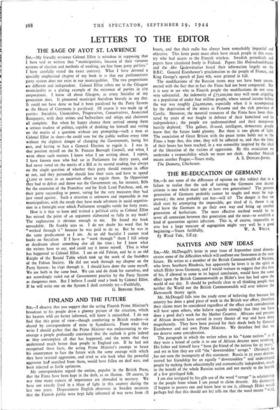LETTERS TO THE EDITOR
THE SAGE OF AYOT ST. LAWRENCE SIR,—My friendly reviewer Colonel Elliot is mistaken in supposing that I have said or written that " municipalities, because of their virtuous systems of election and methods of working, are free from party politics." I have carefully stated the exact contrary. What I have devoted a specially emphasised chapter of my book to is that our parliamentary party system does not exist in our municipalities. The two propositions are different and independent. Colonel Elliot refers me to the Glasgow municipality as a glaring example of the existence of parties in city corporations. I know all about Glasgow, as every Socialist of my generation does. It pioneered municipal Socialism bravely in my day. It could not have done so had it been paralysed by the Party System as the House of Commons is paralysed. Of course it was made up of parties: Socialists, Unsocialists, Progressives, Conservatives, Associated Ratepayers, with their ovines and `bellwethers and whips and chairmen all complete. But when by happy chance there arrived among them a serious student of politics, capable of thinking for himself and voting on the merits of a question without any prompting—such a man as Colonel Elliot in short—he could vote for the public welfare every time without the slightest danger of changing the Government, losing his seat, and having to face a General Election to regain it. I was in that position myself on the St. Pancras Borough Council, and when. I write about such matters I know what I am writing about. I repeat, I have known men who had sat in Parliament for thirty years, and had never voted on the merits of a Bill at its second reading, but always on the single question of whether their party should remain in office or not, and they personally should lose their seats and have to spend 41,000 or more in an uncertain effort to regain them. In Opposition they had to defeat and throw out the Government on, for instance, Bills for the extension of the Franchise and for Irish Land Purchase, and, on their party succeeding to power, voting for the very measures they had just voted against. Such a situation is unknown and impossible in our municipalities, with the result they have made advances in social organisa- tion in a fortnight over which Parliament struggles vainly for forty years.
How is it that so keen and trained a political critic as Colonel Elliot has missed the point of an argument elaborated so fully in my book? The explanation is obvious enough to me. He found my book unreadable. He frankly says so. I do not doubt his word that he " worked through it " because he was paid to do so. But he was in the same predicament as I am. As an old Socialist I cannot read books on Socialism If I have to " work through " them I fall asleep or daydream about something else all the time ; for I know what the writers have to say, and could say it better myself. That is what has happened to Colonel Elliot. I am an old Fabian, and he is an old Knight of the Round Table which took up the work of the founders of the Fabian Society. He did not work through my chapter on the Party System: he slept through h. I should have done the same myself. We are both in the same boat. We can and do think for ourselves, and are accordingly ruled out of Government practice by the Party System as dangerous men. But I believe I could read a book by Colonel Elliot. If he will write one on the System I shall certainly try.—Faithfully,
G. BERNARD SHAW.


























 Previous page
Previous page